Hyundai Bayon vs Jeep Compass – Which model is better for everyday use?
Both models have their strengths – but which one suits you more?
Compare performance, efficiency, price and space directly: Hyundai Bayon or Jeep Compass?
Here’s where it gets real: The technical differences in detail
Costs and Efficiency: Price and efficiency are key factors when choosing a car – and this is often where the real differences emerge.
Hyundai Bayon has a decisively advantage in terms of price – it starts at 20100 £, while the Jeep Compass costs 34200 £. That’s a price difference of around 14143 £.
Fuel consumption also shows a difference: the Jeep Compass manages with 2 L and is therefore significantly more efficient than the Hyundai Bayon with 5.40 L. The difference is about 3.40 L per 100 km.
Engine and Performance: Power, torque and acceleration say a lot about how a car feels on the road. This is where you see which model delivers more driving dynamics.
When it comes to engine power, the Jeep Compass has a clearly edge – offering 240 HP compared to 100 HP. That’s roughly 140 HP more horsepower.
In acceleration from 0 to 100 km/h, the Jeep Compass is decisively quicker – completing the sprint in 7.30 s, while the Hyundai Bayon takes 11.30 s. That’s about 4 s faster.
In terms of top speed, the Jeep Compass performs somewhat better – reaching 200 km/h, while the Hyundai Bayon tops out at 179 km/h. The difference is around 21 km/h.
There’s also a difference in torque: the Jeep Compass pulls significantly stronger with 345 Nm compared to 200 Nm. That’s about 145 Nm difference.
Space and Everyday Use: Whether family car or daily driver – which one offers more room, flexibility and comfort?
Both vehicles offer seating for 5 people.
In curb weight, the Hyundai Bayon is clearly perceptible lighter – 1170 kg compared to 1575 kg. The difference is around 405 kg.
In terms of boot space, the Jeep Compass offers distinct more room – 550 L compared to 411 L. That’s a difference of about 139 L.
In maximum load capacity, the Jeep Compass performs slightly better – up to 1387 L, which is about 182 L more than the Hyundai Bayon.
When it comes to payload, Jeep Compass barely noticeable takes the win – 470 kg compared to 465 kg. That’s a difference of about 5 kg.
All in all, the Jeep Compass shows itself to be is largely superior and secures the title of DriveDuel Champion.
It impresses with the more balanced overall package and proves to be the more versatile companion for everyday use.
Hyundai Bayon
The Hyundai Bayon is a compact crossover that effortlessly merges practicality with modern design. Its sleek exterior and spacious interior make it an ideal choice for urban settings and longer journeys alike. With a focus on comfort and connectivity, this vehicle provides a smooth driving experience paired with advanced technology features.
details @ hyundai.news
@ hyundai.news
 @ hyundai.news
@ hyundai.news
 @ hyundai.news
@ hyundai.news
 @ hyundai.news
@ hyundai.news
 @ hyundai.news
@ hyundai.news
Jeep Compass
The Jeep Compass combines a rugged aesthetic with modern sophistication, making it a standout choice in the compact SUV segment. Its robust design is complemented by a comfortable interior that offers ample space and cutting-edge technology for a seamless driving experience. Whether tackling urban environments or venturing off-road, the Compass provides versatility and reliability, embodying the adventurous spirit synonymous with the Jeep brand.
details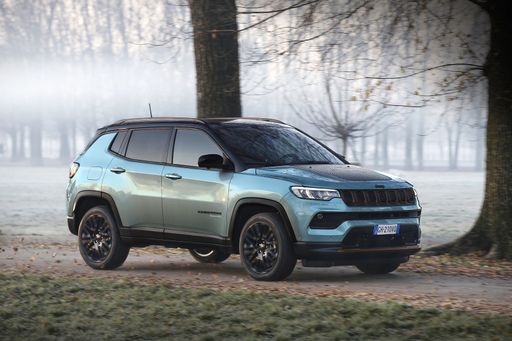 @ media.stellantis.com
@ media.stellantis.com
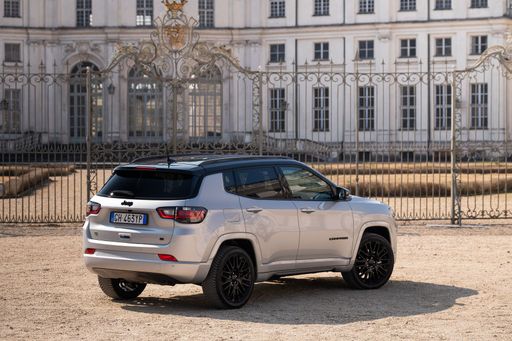 @ media.stellantis.com
@ media.stellantis.com
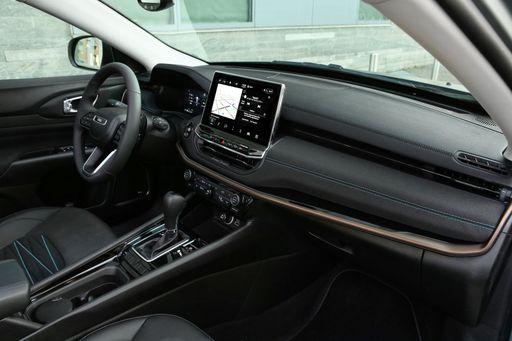 @ media.stellantis.com
@ media.stellantis.com
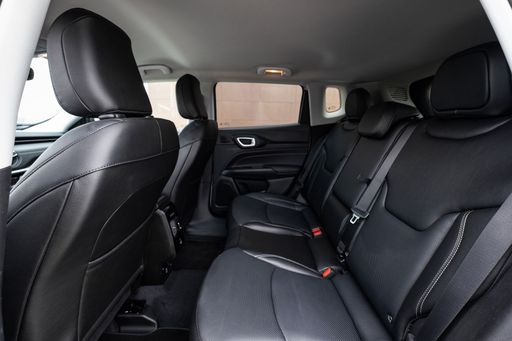 @ media.stellantis.com
@ media.stellantis.com
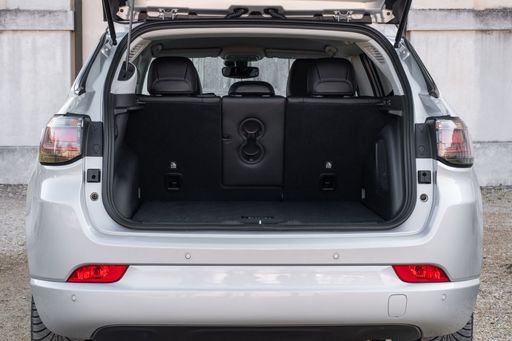 @ media.stellantis.com
@ media.stellantis.com

|

|
|
|
|
Costs and Consumption |
|
|---|---|
|
Price
20100 - 25800 £
|
Price
34200 - 46900 £
|
|
Consumption L/100km
5.4 - 5.5 L
|
Consumption L/100km
2 - 5.9 L
|
|
Consumption kWh/100km
-
|
Consumption kWh/100km
17.50 kWh
|
|
Electric Range
-
|
Electric Range
36 - 500 km
|
|
Battery Capacity
-
|
Battery Capacity
74 kWh
|
|
co2
124 g/km
|
co2
0 - 133 g/km
|
|
Fuel tank capacity
40 L
|
Fuel tank capacity
36 - 55 L
|
Dimensions and Body |
|
|---|---|
|
Body Type
SUV
|
Body Type
SUV
|
|
Seats
5
|
Seats
5
|
|
Doors
5
|
Doors
5
|
|
Curb weight
1170 - 1195 kg
|
Curb weight
1575 - 2198 kg
|
|
Trunk capacity
411 L
|
Trunk capacity
420 - 550 L
|
|
Length
4180 mm
|
Length
4404 - 4552 mm
|
|
Width
1775 mm
|
Width
1819 mm
|
|
Height
1500 mm
|
Height
1629 - 1675 mm
|
|
Max trunk capacity
1205 L
|
Max trunk capacity
1230 - 1387 L
|
|
Payload
460 - 465 kg
|
Payload
465 - 470 kg
|
Engine and Performance |
|
|---|---|
|
Engine Type
Petrol
|
Engine Type
Petrol MHEV, Plugin Hybrid, Electric
|
|
Transmission
Manuel, Automatic
|
Transmission
Automatic
|
|
Transmission Detail
Manual Gearbox, Dual-Clutch Automatic
|
Transmission Detail
Dual-Clutch Automatic, Automatic Gearbox, Reduction Gearbox
|
|
Drive Type
Front-Wheel Drive
|
Drive Type
Front-Wheel Drive, All-Wheel Drive
|
|
Power HP
100 HP
|
Power HP
130 - 240 HP
|
|
Acceleration 0-100km/h
11.3 - 12.4 s
|
Acceleration 0-100km/h
7.3 - 10.3 s
|
|
Max Speed
176 - 179 km/h
|
Max Speed
180 - 200 km/h
|
|
Torque
172 - 200 Nm
|
Torque
230 - 345 Nm
|
|
Number of Cylinders
3
|
Number of Cylinders
4
|
|
Power kW
74 kW
|
Power kW
96 - 177 kW
|
|
Engine capacity
998 cm3
|
Engine capacity
1199 - 1469 cm3
|
General |
|
|---|---|
|
Model Year
2024
|
Model Year
2024 - 2025
|
|
CO2 Efficiency Class
D
|
CO2 Efficiency Class
D, B, A
|
|
Brand
Hyundai
|
Brand
Jeep
|
What drivetrain options does the Hyundai Bayon have?
The Hyundai Bayon is available as Front-Wheel Drive.
The prices and data displayed are estimates based on German list prices and may vary by country. This information is not legally binding.
